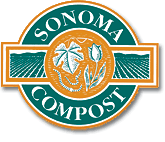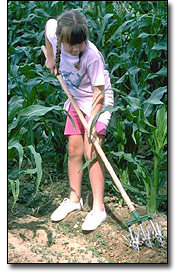 |
|
 |
||||||||
| Here are a few helpful hints that might
answer some of your questions about how to buy and use compost and mulch.
Please feel free to e-mail us your new discoveries or things that work in
your garden, landscape or vineyard so we can share them with our readers. Your Plants Need It All – In addition to compost and mulch, your veggies or landscape need the right amount of moisture, proper sun exposure, appropriate soil and air temperatures, adequate nutrition and protection from the particular bugs or critters that are attracted to them.
Effective Weed Suppression – A thick layer of moistened newspaper or cardboard placed on the soil before applying mulch will increase weed suppression and make the mulch last longer. (Because cardboard can be slippery, it's probably not a good idea to use it on steep slopes.) Mulching Slopes – Mulch will hold better on a steep slope if you rough up the surface a bit before applying it. After applying the mulch, it will "set" if you water it in very gently. Installing Sod – Before installing sod, till a generous amount of compost or Mallard Mulch into the soil rather than simply putting it on top of the existing soil. Overcoming Water Repellence – Compost and mulch sometimes repel water when dry. Overcome this by very slowly saturating these materials with a sprinkler. Once moist, these materials tend to retain that moisture, making subsequent watering easier. Close, But Not Too Close – Keep mulch a few inches from the stems or trunks of your plants. Use Soil For Grade Changes – Don't make significant grade changes with compost. It's mostly organic matter, and will naturally continue to decompose. The result is that the grade you create may not last. A better choice is an amended topsoil. Reduce Trucking Costs – Purchase and apply compost in the spring, summer or fall when it's likely to be dry and light. This will reduce the cost to transport it and the compost will be easier to move and apply. Because the delivery charge is the same for a half-full truck as one that's full, the net cost per cubic yard is lowest when ordering a full truckload of compost or mulch. |
||||||||||
|
||||||||||
 Order,
Amend & Mulch Early
Order,
Amend & Mulch Early